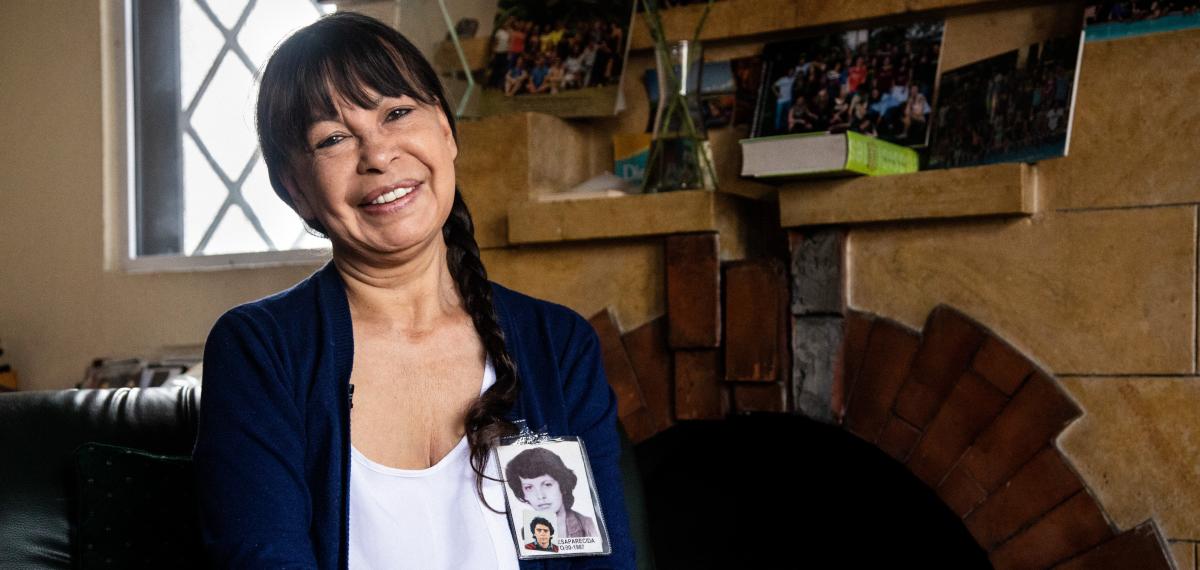In his January 2019 report UN Special Rapporteur on Human Rights Defenders, Michel Forst wrote: “Women defenders often face additional and different risks and obstacles that are gendered, intersectional and shaped by entrenched gender stereotypes and deeply held ideas and norms about who women are and how women should be. In the current political climate, in which there is a backlash against human rights, women defenders are often the first to come under attack.” Here we celebrate, some of Latin America’s human rights defenders working on the front line.
Rosa Maria Mateus Parra, Colombia
Rosa Maria is a lawyer and the co-ordinator of the land and climate change team at the CAJAR collective of lawyers in Colombia. She deals with cases of reparation for victims of state repression and armed conflict and also works with indigenous, peasant and Afro-Colombian communities on collective land rights and protection of the environment.
"The communities have always been right in their historical demands to have their voices heard. They want the government to listen to what they have to say about a development model that has been sold to us with notions of public benefit and which is closely linked to the historical position of corporations in relation to development. The communities have always known that these development models that the national government has dreamt up do not fit with their way of seeing things, with their understanding of the cosmos or with their own intentions. And the government has made a historic mistake in silencing them, in not listening to them and not realising that in reality they are in the wrong."
"Both the corporations and the government are ignorant about Colombia’s wealth, not in terms of the exploitation that they are planning but in terms of biodiversity. Both the corporations and the state have no knowledge of Colombia’s greatest riches: cultural and traditional riches, the riches of their indigenous and African descended communities. They are ignorant of what the communities are trying to tell them: that this model of development is not good for the country. It’s not good for the people."

Lilian Borjas, Honduras
Lilian (second on the right) is secretary of the regional office of the Agricultural Workers Union CNTC, Honduras. Her job is to keep records of any incidents that occur in the area such as arrests, evictions, attacks on peasants and disappearances. She has led a land occupation in opposition to landgrabs by wealthy landowners. She was arrested and faces the possibility of 10 years in prison. The case has been dragging on for six years.
"Thousands of women in this country have been killed by criminals, hired killers and gangs because we wanted to speak out. We are women who want a piece of land to work, to grow food. But in this country, you can’t do that. You can’t demand this right because they will kill us because we are woman."
"We continue the struggle as women but we sometimes feel so impotent. We want to do something but we can’t make it happen because there are so many traps on the way, tricks that the government plays. When we make demands as women, they call us rebels and fighters. They say we are terrorists. It is the women who have to face poverty every day. It is women who have to go to fetch water to bath our children. Now as women we are confronting the mining companies because we need the natural resources. We are fighting for what is ours."

Yaneth Bautista, Colombia
Yaneth Bautista is the director of the Nidia Erica Bautista Foundation for Human Rights, an organisation that supports 500 victims of forced disappearance in eight regions of Colombia. Yaneth’s sister for whom the foundation is named, and Yaneth’s partner were abducted by the army in 1987 for being members of the Movimiento 19 April political group. Since that time Yaneth has been fighting for justice for victims of disappearance.
“The work that we do with victims of forced disappearance is holistic and comprehensive. We offer them legal support, we do empowerment work as most of them are women, to enable them to change from being victims of violence to political and social agents who can work for social change. We also lobby the government to change public policies in favour of the rights of victims and we also work with the international community.”
"And we do something which is very important which is the documentation of cases for the Truth Commission and the Special Jurisdiction for Peace and the Unit for the Search of Disappeared People. And we give moral support to the families. We search for the Disappeared because families come to us looking for the answers that the state will not give them. Where are our loved ones? Why were they taken?"
"We have this total of 80,000 victims, of which about 30% are women and about 25% are young people under the age of 18. And the women while they were held in captivity, like Nidia Erica suffered sexual violence. This has not been investigated or made public and this is similar to the state’s response to forced disappearances."
"We want to submit 500 cases from the eight regions in which we work, to the Truth Commission. We have a whole team where we run the Leadership School for Women Relatives. This school is a key tool for empowerment where women learn to document cases starting with their own situation and also working on the cases of other relatives and we are also working with a team of students from different universities to present these cases to the Truth Commission."
If you share our vision of a world where Women Human Rights Defenders are free to protect their rights and lands without fear of reprisals and violence, you can help by donating to the 'Shoulder to Shoulder' campaign run by Peace Brigades International visit https://peacebrigades.org.uk/















